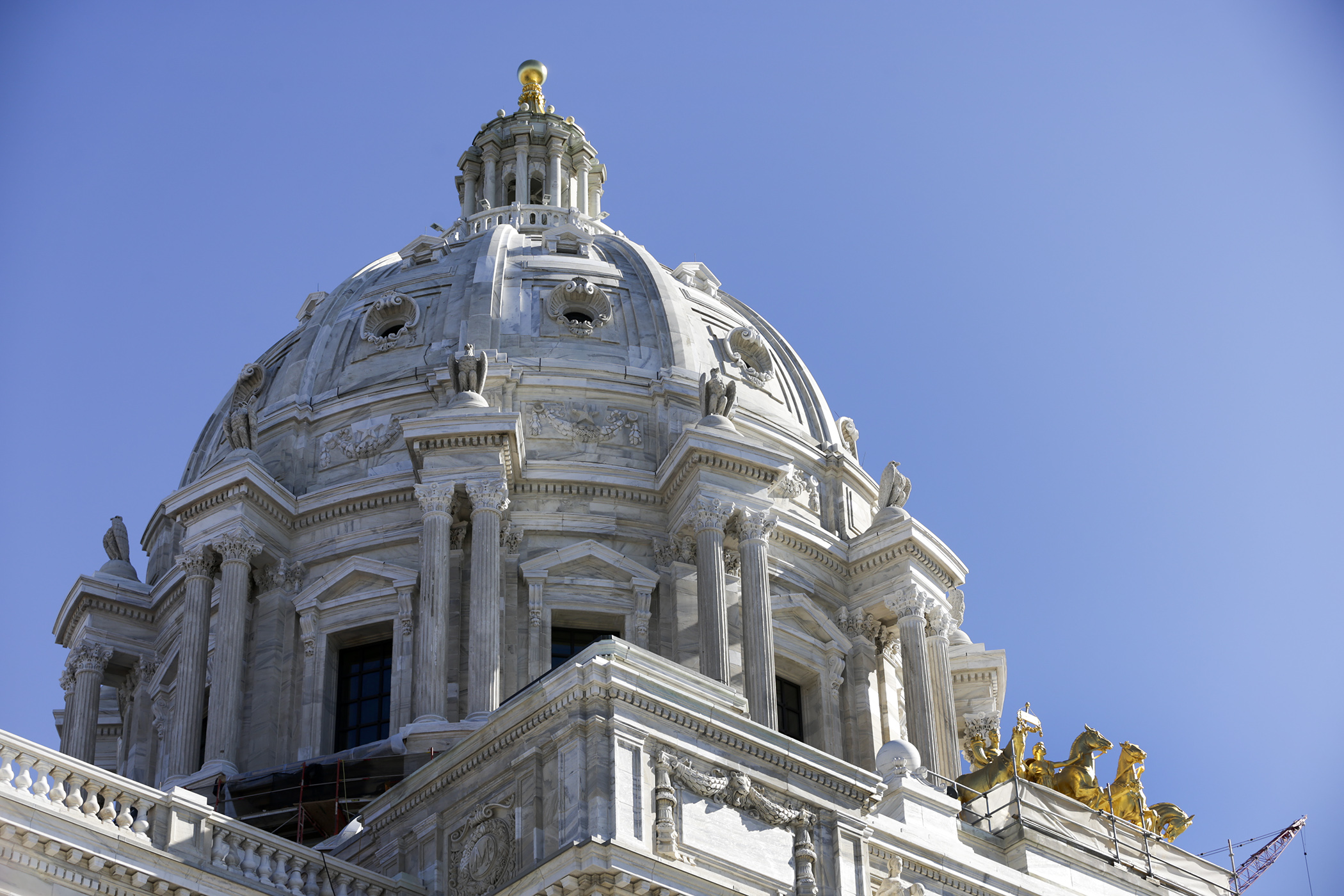Repeal of ban on plastic bag ordinances, limited spending included in state and local government bill that clears committee

Paper or plastic may not be a bagging option. Healthier food choices at the seat of state government may be forthcoming. And local capital investment requests may need to come with assurances.
All are parts of a supplemental state and local government policy and finance bill approved Thursday.
Following the party-line vote by the House State and Local Government Finance and Policy Committee, HF3431, including a delete-all amendment, awaits action by the House Ways and Means Committee.
“There are a lot of good bills in here. I appreciate the robust conversation we’ve had,” said Rep. Ginny Klevorn (DFL-Plymouth) in a brief final comment on the bill. She is the sponsor and committee chair.
Rep. Jim Nash (R-Waconia) was only slightly longer in his closing comments, instead predicting “a very full-throated conversation” when the bill reaches the House Floor. One disappointment he did express is that some bill provisions were not heard by the committee. “Both sides have done it, and it’s garbage.”
From a financial standpoint, the package calls for $6.95 million in supplemental General Fund spending in fiscal year 2025, above the committee’s $2.5 million target. However, a $4.95 million cancellation and reappropriation from last year’s law for the Capitol Mall Design Framework is included.
[MORE: View the spreadsheet; Session Daily story when bill unveiled]
The bill would transfer $500,000 to a healthy and sustainable food options account in the special revenue fund “for the purpose of enhancing and sustaining healthy food alternatives on the State Capitol complex.”
“This amount of money will help us determine who is the best vendor to bring into the complex,” Klevorn said. “Is it necessary for [the Department of Administration] to have the flexibility to negotiate a two-year contract, a four-year-contract, to investigate what it means to have healthy eating at the Capitol, what it means to have culturally appropriate food in the Capitol, what does it mean to meet the dietary needs of Minnesotans who come to the Capitol to do democracy?”
Nash unsuccessfully offered an amendment to eliminate the provision, saying the current operator could simply be asked to provide healthier options. “It does not cost $500,000 to effectively administer a [request for proposal].”
It failed along party lines as did Nash-proposed amendments to use the money for a vegetable garden within the Capitol Complex, and transfer the funds to the state’s Healthy Eating, Here at Home program. Per statute, the program “is to provide incentives for low-income Minnesotans to use federal Supplemental Nutrition Assistance Program (SNAP) benefits for healthy purchases at Minnesota-based farmers' markets, mobile markets, and direct-farmer sales.”
Plastic bags and bonding
The bill would repeal the prohibition on political subdivisions from imposing a bag ban. It comes from HF3345, sponsored by Rep. Sydney Jordan (DFL-Mpls).
Klevorn calls this is a local-control issue, and supporters previously emphasized the bill does not guarantee a plastic bag ban, but simply allows one should local leaders desire.
An amendment from Rep. Danny Nadeau (R-Rogers) to eliminate the language fell along party lines.
In a year where bonding is supposed to be a legislative focus, a proposed policy change from Rep. Fue Lee (DFL-Mpls) does not have bipartisan support. Lee chairs the House Capital Investment Committee.
Coming from HF3582, it would require a grantee of state money for a capital improvement project to establish a replacement fund for major rehabilitation, expansion, or replacement of the project once it has reached its useful life.
Failing on party lines was an amendment offered by Rep. Jim Joy (R-Hawley) to indicate legislative intent is bonding dollars are only be used for “essential public infrastructure.”
Successful amendments
In addition to largely technical and clarifying amendment, three others were included that would:
- in part for safety purposes, limit access in the hallway outside the House caucus rooms in the State Capitol when the Legislature is in session;
- specify that certain actions authorizing increased residential density do not cause pollution, impairment, or destruction under the Minnesota Environmental Rights Act; and
- stop the accountancy board from conducting an audit of a licensee’s continuing education compliance in the 60 days prior to the individual tax filing deadline.
Other amendments failing along party lines would have:
- put the new state flag and seal up for a vote at the 2024 election;
- more easily allowed a city or county “to establish, own, and operate a municipal cannabis store”; and
- allowed counties to post legal notices and meeting minutes on their websites if a qualified newspaper ceases to exist for any reason except consolidation.
Klevorn said Rep. Brad Tabke (DFL-Shakopee) has a similar postings’ bill for school districts and she’d like to work with Tabke and Rep. Bobbie Harder (R-Henderson), who offered the amendment, on a future amendment that would work for all parties.
Related Articles
Search Session Daily
Advanced Search OptionsPriority Dailies
Speaker Emerita Melissa Hortman, husband killed in attack
By HPIS Staff House Speaker Emerita Melissa Hortman (DFL-Brooklyn Park) and her husband, Mark, were fatally shot in their home early Saturday morning.
Gov. Tim Walz announced the news dur...
House Speaker Emerita Melissa Hortman (DFL-Brooklyn Park) and her husband, Mark, were fatally shot in their home early Saturday morning.
Gov. Tim Walz announced the news dur...
Lawmakers deliver budget bills to governor's desk in one-day special session
By Mike Cook About that talk of needing all 21 hours left in a legislative day to complete a special session?
House members were more than up to the challenge Monday. Beginning at 10 a.m...
About that talk of needing all 21 hours left in a legislative day to complete a special session?
House members were more than up to the challenge Monday. Beginning at 10 a.m...